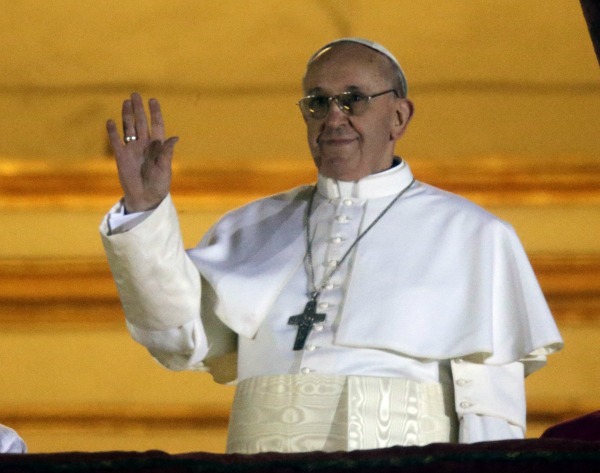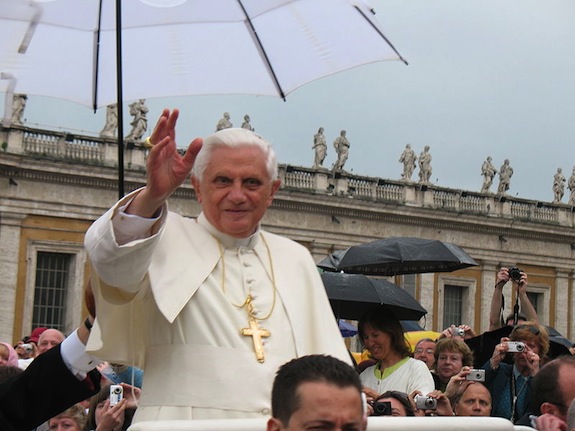Palestine Cry: Syria
Gospel According to Saint Matthew
Chapter 7
[16] By their fruits you shall know them. Do men gather grapes of thorns, or figs of thistles?
[17] Even so every good tree bringeth forth good fruit, and the evil tree bringeth forth evil fruit.
[18] A good tree cannot bring forth evil fruit, neither can an evil tree bring forth good fruit.
[19] Every tree that bringeth not forth good fruit, shall be cut down, and shall be cast into the fire.
[20] Wherefore by their fruits you shall know them.
[21] Not every one that saith to me, Lord, Lord, shall enter into the kingdom of heaven: but he that doth the will of my Father who is in heaven, he shall enter into the kingdom of heaven.
Look at Syria now and read the history below. If Francis is a true follower of Our Lord and Saviour Jesus Christ Who said, "Wherefore by their fruits you shall know them" and he addresses Syria and the whole host of genocides undertaken by Superpowers and the Zionists and the rest of those imbued with murderous agendas, especially the murderous agendas of abortion and Agenda 21, then he deserves the full support of all Christians and the Ummah and all people of good will - just like St. Francis of Assisi.
Palestine Cry: Palestine Cry: “Washington’s Pope”? Who is Pope Francis I? Cardinal Jorge Mario Bergoglio and Argentina’s “Dirty War” | Global Research
Argentinian Jorge Mario Bergoglio Chosen As New Pope | Smart News
March 13, 2013 4:42 pm

Pope Francis waves to the crowd from the central balcony of St. Peter’s Basilica at the Vatican, Wednesday, March 13, 2013. Cardinal Jorge Bergoglio who chose the name of Francis is the 266th pontiff of the Roman Catholic Church. (AP Photo/Gregorio Borgia)
In Vatican City today, Jorge Mario Bergoglio, 76, became the new Pope Francis. After Catholic cardinals debated the options earlier today, a puff of white smoke issued from the Sistine Chapel’s chimney indicated that the decision was complete,
the New York Times reports.
Pope Francis I, the 265th Pontiff of the Roman Catholic church, is the first South American to hold the position, and by choosing Bergoglio, the Church shows its support to the Global South, where most of the world’s Catholics reside, the
Times writes. Born to Italian emigrant parents, Bergoglio grew up in Buenos Aires and formerly led the church’s Jesuit order. He is the first person born outside of Europe to be elected pope since the Byzantine era. Popes
once hailed from Africa, Syria, Palestine and parts of the Byzantine Empire; the last pope to come from outside of Europe was Gregory III, of Syria, who was elected pope by acclamation in 731.
[Eternal faith and beliefs: Gregory III of Rome]
Gregory III faced controversies over religious issues like the use of holy images. The host of troubles facing the newest pope include proper management of the Vatican banks. The Times writes that the cardinals who elected Pope Francis were looking for “a pope that understands the problems of the Church at present”—many of them bureaucratic—and who is strong enough to tackle them.
Read more: http://blogs.smithsonianmag.com/smartnews/2013/03/argentinian-jorge-mario-bergoglio-chosen-as-new-pope/#ixzz2NZTaWMRN
In the Entire History of the Catholic Church, Only a Handful of Popes Have Resigned | Smart News
February 11, 2013 10:02 am
308: Pope Marcellinus stepped down from the position shortly before dying. No one is sure why.
366: Pope Liberius also stepped down without a clear reason.
1009: Pope John XVIII ended his time as pope and retired to a monastery. Many accounts suggest that John was beholden to the Crescentii family, a powerful Roman clan.
1045: Pope Benedict IX was the first pope to very clearly step down. (Earlier accounts are fuzzy, historically.) This Benedict was apparently quite a handful. His resignation was a business deal of sorts: he sold his seat for a large sum of money to the Archpriest John Gratain. This transaction was so scandalous that the king intervened, reinstating Benedict as pope. Benedict IX was then deposed again, reinstated once more, and finally driven away to make room for Damasus II.
1294: Pope Celestine V is probably the most famous of abdicators. After just five months in the seat, Celestine wrote a decree that allowed popes to step down, before doing so himself.
The site Catholic Online puts it this way:
He was Pope only about five months. Because he was so humble and simple, everyone took advantage of him. He could not say “no” to anyone, and soon matters were in great confusion. At last, the Saint decided that he had better give up his position as Pope. He did so and then threw himself at the feet of the Cardinals for not having been capable of governing the Church.
Celestine V inherited a troubled papacy which was largely under the thumb of Charles II of Sicily. Through his reign Celestine was unable to do much of anything without approval and support from Charles – something Celestine himself recognized. This was probably the reason why he abdicated his position after only 5 months.
1415: Pope Gregory XII resigned in
an attempt to end the Western Schism, a forty year period during which three different people—Roman Pope Gregory XII, Avignon Antipope Benedict XIII, and Pisan Antipope John XXIII—claimed to be the head of the Catholic Church.
2013: Which brings us to today. Here’s the full resignation from Benedict XVI.
Dear Brothers,
I have convoked you to this Consistory, not only for the three canonizations, but also to communicate to you a decision of great importance for the life of the Church. After having repeatedly examined my conscience before God, I have come to the certainty that my strengths, due to an advanced age, are no longer suited to an adequate exercise of the Petrine ministry. I am well aware that this ministry, due to its essential spiritual nature, must be carried out not only with words and deeds, but no less with prayer and suffering. However, in today’s world, subject to so many rapid changes and shaken by questions of deep relevance for the life of faith, in order to govern the bark of Saint Peter and proclaim the Gospel, both strength of mind and body are necessary, strength which in the last few months, has deteriorated in me to the extent that I have had to recognize my incapacity to adequately fulfill the ministry entrusted to me. For this reason, and well aware of the seriousness of this act, with full freedom I declare that I renounce the ministry of Bishop of Rome, Successor of Saint Peter, entrusted to me by the Cardinals on 19 April 2005, in such a way, that as from 28 February 2013, at 20:00 hours, the See of Rome, the See of Saint Peter, will be vacant and a Conclave to elect the new Supreme Pontiff will have to be convoked by those whose competence it is.
Dear Brothers, I thank you most sincerely for all the love and work with which you have supported me in my ministry and I ask pardon for all my defects. And now, let us entrust the Holy Church to the care of Our Supreme Pastor, Our Lord Jesus Christ, and implore his holy Mother Mary, so that she may assist the Cardinal Fathers with her maternal solicitude, in electing a new Supreme Pontiff. With regard to myself, I wish to also devotedly serve the Holy Church of God in the future through a life dedicated to prayer.
BENEDICTUS PP XVI
People will surely wonder exactly why Benedict stepped down, since it’s such a rare occurrence.
The New York Times points out that during his predecessor’s tenure, the pope (then Cardinal Ratzinger) indicated that a pope who “sees that he absolutely cannot do [the job] anymore” would resign. But no one knows yet what exactly pushed him to make this decision.
Read more: http://blogs.smithsonianmag.com/smartnews/2013/02/in-the-entire-history-of-the-catholic-church-only-a-handful-of-popes-have-resigned/#ixzz2NZTFaJXG
Now: The Final Trial




















































































No comments:
Post a Comment